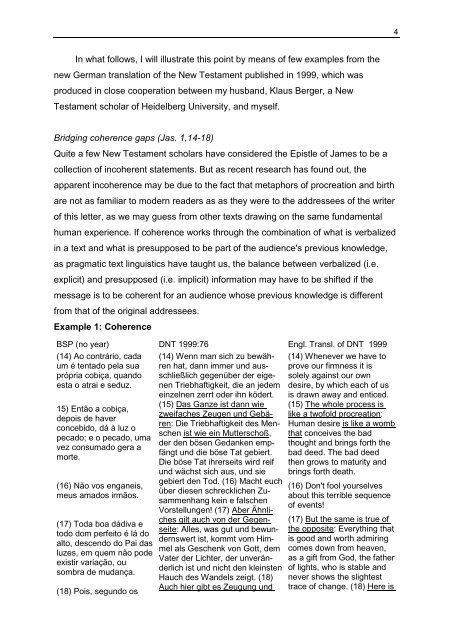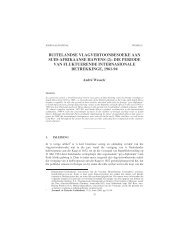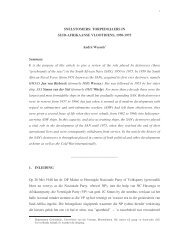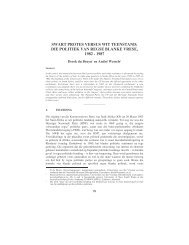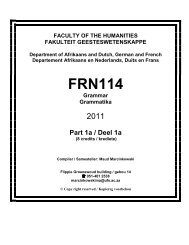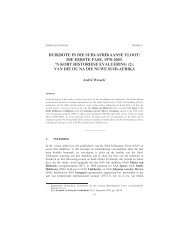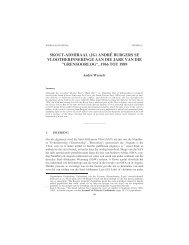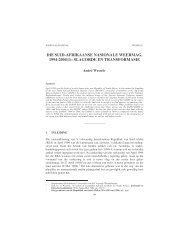Function plus Loyalty: Ethics in Professional Translation
Function plus Loyalty: Ethics in Professional Translation
Function plus Loyalty: Ethics in Professional Translation
Create successful ePaper yourself
Turn your PDF publications into a flip-book with our unique Google optimized e-Paper software.
In what follows, I will illustrate this po<strong>in</strong>t by means of few examples from the<br />
new German translation of the New Testament published <strong>in</strong> 1999, which was<br />
produced <strong>in</strong> close cooperation between my husband, Klaus Berger, a New<br />
Testament scholar of Heidelberg University, and myself.<br />
Bridg<strong>in</strong>g coherence gaps (Jas. 1,14-18)<br />
Quite a few New Testament scholars have considered the Epistle of James to be a<br />
collection of <strong>in</strong>coherent statements. But as recent research has found out, the<br />
apparent <strong>in</strong>coherence may be due to the fact that metaphors of procreation and birth<br />
are not as familiar to modern readers as as they were to the addressees of the writer<br />
of this letter, as we may guess from other texts draw<strong>in</strong>g on the same fundamental<br />
human experience. If coherence works through the comb<strong>in</strong>ation of what is verbalized<br />
<strong>in</strong> a text and what is presupposed to be part of the audience's previous knowledge,<br />
as pragmatic text l<strong>in</strong>guistics have taught us, the balance between verbalized (i.e.<br />
explicit) and presupposed (i.e. implicit) <strong>in</strong>formation may have to be shifted if the<br />
message is to be coherent for an audience whose previous knowledge is different<br />
from that of the orig<strong>in</strong>al addressees.<br />
Example 1: Coherence<br />
BSP (no year) DNT 1999:76 Engl. Transl. of DNT 1999<br />
(14) Ao contrário, cada<br />
um é tentado pela sua<br />
própria cobiça, quando<br />
esta o atrai e seduz.<br />
15) Então a cobiça,<br />
depois de haver<br />
concebido, dá à luz o<br />
pecado; e o pecado, uma<br />
vez consumado gera a<br />
morte.<br />
(16) Não vos enganeis,<br />
meus amados irmãos.<br />
(17) Toda boa dádiva e<br />
todo dom perfeito é lá do<br />
alto, descendo do Pai das<br />
luzes, em quem não pode<br />
existir variação, ou<br />
sombra de mudança.<br />
(18) Pois, segundo os<br />
(14) Wenn man sich zu bewähren<br />
hat, dann immer und ausschließlich<br />
gegenüber der eigenen<br />
Triebhaftigkeit, die an jedem<br />
e<strong>in</strong>zelnen zerrt oder ihn ködert.<br />
(15) Das Ganze ist dann wie<br />
zweifaches Zeugen und Gebären:<br />
Die Triebhaftigkeit des Menschen<br />
ist wie e<strong>in</strong> Mutterschoß,<br />
der den bösen Gedanken empfängt<br />
und die böse Tat gebiert.<br />
Die böse Tat ihrerseits wird reif<br />
und wächst sich aus, und sie<br />
gebiert den Tod. (16) Macht euch<br />
über diesen schrecklichen Zusammenhang<br />
ke<strong>in</strong> e falschen<br />
Vorstellungen! (17) Aber Ähnliches<br />
gilt auch von der Gegenseite:<br />
Alles, was gut und bewundernswert<br />
ist, kommt vom Himmel<br />
als Geschenk von Gott, dem<br />
Vater der Lichter, der unveränderlich<br />
ist und nicht den kle<strong>in</strong>sten<br />
Hauch des Wandels zeigt. (18)<br />
Auch hier gibt es Zeugung und<br />
(14) Whenever we have to<br />
prove our firmness it is<br />
solely aga<strong>in</strong>st our own<br />
desire, by which each of us<br />
is drawn away and enticed.<br />
(15) The whole process is<br />
like a twofold procreation:<br />
Human desire is like a womb<br />
that conceives the bad<br />
thought and br<strong>in</strong>gs forth the<br />
bad deed. The bad deed<br />
then grows to maturity and<br />
br<strong>in</strong>gs forth death.<br />
(16) Don't fool yourselves<br />
about this terrible sequence<br />
of events!<br />
(17) But the same is true of<br />
the opposite: Everyth<strong>in</strong>g that<br />
is good and worth admir<strong>in</strong>g<br />
comes down from heaven,<br />
as a gift from God, the father<br />
of lights, who is stable and<br />
never shows the slightest<br />
trace of change. (18) Here is<br />
4


